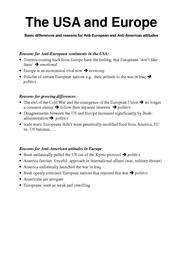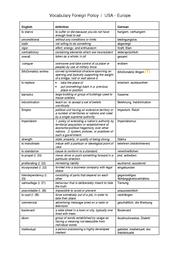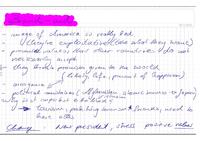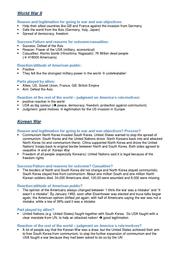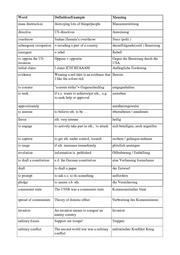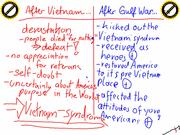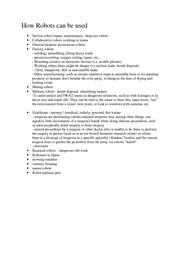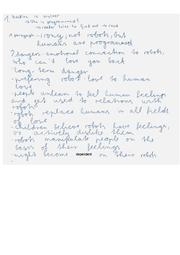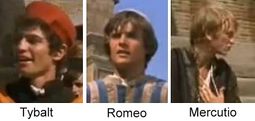Thelenberg 2012 13
Abitur 2013
Mündliche Vorprüfung
- Ablauf wie mündliche Schulaufgabe in 11/2
- Prüfungstermine
Colloquium: The human body as a piece of art:
Plastic surgery: statistics
Plastic Surgery for Men:
- want to have more success in jobs
- want to attract younger women
- want to have an image of vitality
- makes them feel better
- to look more attractive
- to get attention from other people
- to look young, fit, with good reactions and professional
- to bring out their character
- to prevent prejudice
Plastic Surgery for Women:
- to look like the women in the media
- everybody does it
- prices go down
- feels good to get told that they look good
- to improve their self-confidence
- to remind themselves of the good times
- people don´t like themselves because they are brainwashed by the media
- to be more attractive to men
- to get better job chances
- youth shows fertility
- to wear the newest dresses ( fashion ) ????????
Plastic surgery for teenagers: Video
- Plastic surgery performed on teens in the USA: Motives, views and attitudes, effects and problems covered by this video clip ...!
How much do looks count today? (Cf. worksheet/handout)
- Looks count ... Text on worksheet, too!
- Looks count more than skills at work (and that goes for men too). Text on worksheet!
The cult of youth, beaty and the body:
.
Colloquium Science and Technology: The use of robots
- See here!
Colloquium Deforestation
Look at our blog http://no2deforestation.wordpress.com/!
Colloquium Globalisation
In addition to course handouts etc.:
- Book p. 176 - 178
- Pros and Cons
- Globalisation and the Internet
- Talk on globalization and the role of the internet.
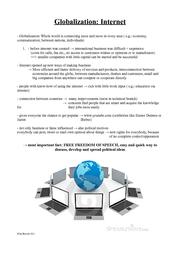
- Talk on globalization and culture!
Colloquium Brave New World
See notes/course handouts, here in this wiki, your reading diaries and ...
.
Colloquium The Incident (Campton) and Modern Drama
See course handouts ...
Colloquium Shakespeare
See notes/course handouts, here in this blog and
Colloquium Role and image of the USA since 1945
See course materials and here!
Colloquium Society and Class
See handouts and here!
Colloquium The Christian Right in the USA
See course materials and here!
.
Homework
Recent homework
Basic Skills & Information
- Information on homework and oral grades
- Reading and Marking technique - SQ3R Method A useful method to read, mark and annotate texts.
- Working with Cartoons
- A good speech/speaker ...
- Answering questions on the text
- Starting a paragraph
- Starting an Essay/Comment
- Writing an interview
- Mediation
- Translation (E→G)
- Characterization
- Building an Argument
Brave New World
Brave New World has a separate page now! Open here!
US Foreign Policy and Relations to Europe
Typically American? A collection of Stereotypes?
- For the concept of stereotypes see here!
- To compare this to stereotypes about Germans, go to How to be German in 20 easy steps!
| Typical Americans are .... / Typically, in America you find ... / In America "they" believe in ... |
|---|
|
.
Cartoons on US Cultural Hegemony / Americanization
- Cartoon on Americanization
- Cartoon of President George W. Bush as Cowboy
- Working with Cartoons
- Notes on Cartoon!
Text on US Cultural Hegemony
1. What reasons for anti American feelings in Europe does the text give?
- American culture ousts European culture
- German or other European languages are being flooded with English terms and expressions
- Sense of national identity severely disturbed
- Europeans are afraid of loosing their cultural autonomy
- European culture replaced by American culture
- Vietnam-war
- Guantanamo Bay and Abu-Ghraib
- Americans ignore and don't know about European culture
- American worldview is centered on America
- Americans expect everyone to think and speak American
- Americanization as cultural imperialism
2. Why has Germany been especially quick at embracing American culture?
- America's help after WWII (→ Marshall Plan) ==> Germans felt grateful
- German culture discredited by Nazis, German from "Dichter und Denker" to "Richter und Henker"
- Germans looked for new cultural model → culture of the victoriuos, democratic and successful USA
- Germans were not allowed to have and learned to feel ashamed of patriotic feelings → easy to take over Western/US mass culture
- US culture meant luxury, affluence, freedom, individualism
The USA and Europe - increasingly difficult relations?
The results of your work on the two texts on the relations between the USA and Europe:
Vocabulary
Text: Brand Aid
- Cf. Greenline p. 60/61
- Click several times to enlarge!
The Wars of the USA in the 20th and 21st century
- Cf. worksheet on Wars
- Your summaries of the wars:
Vocabulary
The Home Front: Exorcising an old Demon
- Cf. workshhet, or partly here (p. 267/268):
- Comparison Vietnam War and Gulf War:
Science and Technology
Listening Test
Types of robots
Using Robots
Effects of using robots ...
Summary of the two articles:
Advantages of using robots:
Military robots:
- advantage in war
- unlimited supply of robots
- fewer in human lives lost
- more effective use of weapons than human soldiers
- arms race in robotics has begun → US a must keep advantage in this field
- Machines: no negative or strong emotions
- better at quick, rational decision-making
- more rational/calm and ethical decisions (no anger, revenge) is
Household robots
- save time/work/do boring and dirty jobs ⇒ useful helpers
- can be used to control home/house remotely
Problems/dangers of using robots:
Military robots
- Sufficient ability to identify proper targets/combatants?
- right to decide about acceptable human collateral damage?
- inability to show mercy/give pardon
- who is responsible if robot kills wrongly
- technical ability to kill and destroy is more easily developed than more role/ethical control-mechanisms
- dangerous, 100% obedient tool in the hands of dictators etc.
Household robots
- if hacked, they could be illegally used to
- control our homes
- spy on us
- attack us
| Pro | Con |
|
|
.
Text: Programmed for Love
- The original text on the problematic relations between people and robots can be read here!
- Answers to questions 1 and 2 (click several times!):
.
Cartoon: Driverless Cars
Look at this cartoon about "Robotics: The dangers of driverless Cars" and write notes for an oral analysis!
Analysis "Robotics: The dangers of driverless Cars"
In the picture you can see
- car is going at high speed
- has already collided with/rammed a letter box, a stop sign, a trash can, a garden fence and a fire hydrant and has hit a cow, which is now stuck on the bonnet/hood. it looks mad/bewildered
- the driver is an average looking office worker in a shirt and tie
- he is making a call on his cellphone/mobile and at the same time drinking a softdrink from a takeaway plastic mug
- he is obviously not watching were he is going or what is in his way
- He seems to call "Detroit" and happily states that they are "too late" and that "Driverless cars are here already. 2 exclamation marks, capital letters and man's happy, self-assured face show that the driver is in high spirit + very convinced of what he does.
Analysis:
- Detroit?
- (formerly) famous for being the center of US car industry, here new cars/designs are planned + built
- too late?
- new driverless car already in use – car industry is too late – or too late for the people thing the car has crashed into?
- dangers?
- dangers resulting from driverless car stupid drivers or leaving control to device/machine can have effects shown here
- driverless cars? …. positive/negative concept? → negative
- but there is driver? → put only physically present – doesn't properly drive car (the same will be the case in a driverless car controlled by robot/technology!)
- link to robotics? → no person will drive driverless cars → will the result be as bad as depicted here
What is depicted/criticized/warned against/made fun of?
- over-reliance on machine/technology
- if here already we have what driverless cars will be like → dangerous/useless idee
- if people come to rely on technology instead of properly driving, the result may still look as the …
- people are dangerous/stupid: now they are distracted/don't properly drive because of eating and making phonecalls, then they will completely rely on machines/not drive themselves ...
.
Drama, Baby, Drama
From Poetry to Drama
Watch the difference between poetry and drama:
To turn the recital of a poem into "drama" one must/should ...
- put emotion in by varying the level of your voice
- vary your speed, speak in a shivering/slow/tired voice
- use gestures and facial expressions
- introduce music to support the mood e.g. slow instrumental piece
- e.g have several actors, representing the victims and the police. The victims are taken away one after the other. One person recites the poem.
- create interaction between characters e.g. others passivly watch
- use costumes e.g. for the soldiers, police, servants, different classes
- use images as background
- use a chorus, which speaks certain passages together
- not do any of these to keep it minimalistic
- use lighting e.g. spot on one actor
.
Voice and the characters' interaction change everything!
... or can at least almost completely change the effect of the same line.
- Compare these examples!
- Practice this sentence with a partner (Take turns, play at least two different versions, the silent partner uses gesture/facial expressions)!
- I don't know what what she's up to. I just want to say "Good-bye".
- What is the general situation? (When, where does this happen?)
- What is the relation between the two characters (Who are they?)
- What do the characters want to express? (verbally and non-verbally)
Drama - a Definition
Drama is the specific mode of fiction represented in performance. The term comes from a Greek word meaning "action" (Classical Greek: δρᾶμα, drama), which is derived from "to do" (Classical Greek: δράω, drao). The enactment of drama in theatre, performed by actors on a stage before an audience, presupposes collaborative modes of production and a collective form of reception. The structure of dramatic texts is directly influenced by this collaborative production and collective reception. From http://en.wikipedia.org/wiki/Drama
Drama - Identify main aspects and elements
Look at the following webpages and try to sum up/note down the main aspects of drama. Do not use the video examples yet!
Write your answers into your groups section
- Do not just copy and paste!
- Try to shorten and condense!
- If there are no examples e.g. for the effect of a certain element - find simple ones!
- Try to clearly work out what possibilities/effects a certain element/aspect of drama has!
Elements of Drama - as a literary Genre - (pages 1,3,4)
BBC GCSE Revision on Elements of Drama
- (Do not use page 2 of this set)
Plot, action and content
- The plot of the drama is shown in the 'through-line' of the drama - its beginning, middle and end, the arrangement of the scenes - although it doesn't have to be presented in a linear structure. The characters in a play are also part of the plot.
- The action of the drama consists in the events that the characters take part in as they act the play.
- The content of the drama lies in the themes it deals with, eg bullying, the responsibilities of power, the bravery of ordinary people etc.
Climax/anti-climax
- Climax / anti-climax → expectation in the audience → intent → relieved when things turn out well
Contrast
- Contrasts are used in dramas to focus the audience’s attention. They bring the drama to life and make it interesting.
- Example: In a courtroom drama: At first there's the hectical actionof bringing in the prisoner, with everyone scurrying around trying to see and hear the judge's pronouncement. Then there's the sound of the gavel banging on the judge's desk - and the resulting quiet before he pronounces the sentence. The audience can't fail to be interested!
Elements of drama- as a literary genre(pages 5-7)
BBC GCSE Revision on Elements of Drama
Characterization:
- the way they walk and move (body language)
- the way they speak (vocal qualities)
- their reaction to events in the drama
- the way you present the character
Dramatic conventions: techniques for dramatic effects:
- slow motion
- freeze-frame (the picture standing)
- audience aside
- soliloquy (monoloque)
- using one part of the stage as one location, and a different part as another location
Possible symbols (=standing for "real things") for making the drama more believable:
- props (eg a torn wedding photograph to represent a divorce)
- gestures (eg finger on lips as a symbol of silence)
- expressions (eg open mouth to represent surprise)
- costume (a white costume as a symbol of innocence, purity, death, or lack of emotion))
- lighting (eg blue lighting to represent night-time)
- setting (dry ice vapour to represent a snowy wood; a mountain top → loneliness)
Irony
See esp. Dramatic Irony
Aspects of Drama as medium -(pages 1-3)
BBC GCSE Revision on Drama - Medium I 1. Costume, masks and make-up
- costumes give the characters extra features
- masks express non-human characters
- make-up "ages" actors or indicates fantasy characters
2. Sounds and music
- add atmosphere
- emphasize action happening on stage
- help set the scene
- indicate a change of time or location
- focus attention on to a character
3. Lighting
- Spot: one character is stressed
- Fresnel: soft overall light
- Flood: clear wide-angled light
- colour filters can be used for the last three ones.
- Strobe: flashing lights used for special effects.
Aspects of Drama as a medium-(pages 4-6)
BBC GCSE Revision on Drama - Medium II
Space and levels:
- acting area is called „stage“
- how it is used is affected by the drama you are going to play
- levels (Ebenen): visually more interesting, more opportunity for actors, levels may represent different places, audience see parts more clearly
Movement, mime, gesture
- Movement → characterization, feelings, etc. , e.g. (jumping, hyperactive movements, hesitate), must fit character
- Mime → physical theatre (without words), which also uses mime techniques, and where actors can also mime items of set or props
- facial expression (dt.: Mimik!) → expresses feelings, can be combined with gestures/language
- Gesture → arm/ leg movements, bow one’s head → body language
Sets and Props
- stage sets (Bühnenbild): create the backgrounds; best: simple
- props (Requisiten): items which are held or used by actors (need lot of experience, because they can slow down action; effect: characterize s.o, more demonstrative, needed for the action)
Aspects of Drama as a medium - (pages 7-8)
BBC GCSE Revision on Drama - Medium III
Voice:
- tone: appropriate to person/situation (e.g. old person, aggression, you are sad …)
- volume: loudness (stress words, shout, whisper)
- pitch (high/low → feelings)
- clarity: use clear speech - or mumble, if it helps to characterize the person you play
- pace: not too fast / very slow (insecure?); vary speed°!
Spoken Language:
- Language registers: depend on the person you speak to (social status, children, foreigner etc.)
- verse: stylised speech
- Shakespearean language: to reflect Shakespearean times
- slang: to reflect down-to-earth daily life
Shakespeare's Romeo and Juliet
The Prologue
Prologue to the most lamentable story of Romeo and Juliet
Two households both alike in dignity,
In fair Verona, where we lay our scene,
From ancient grudge break to new mutiny,
Where civil blood makes civil hands unclean.
From forth the fatal loins of these two foes
A pair of star-cross’d lovers take their life;
Whose misadventur’d piteous overthrows
Doth with their death bury their parents’ strife.
The fearful passage of their death-mark’d love
And the continuance of their parents’ rage,
Which, but their children’s end, nought could remove,
Is now the two hours’ traffic of our stage;
The which, if you with patient ears attend,
What here shall miss, our toil shall strive to mend.
- What is the function of this prologue?
- What can you say about the language and structure of these lines?
- Learn lines 1 - 8 by heart + practice reciting them .....!
.
Characterization
Romeo
Look at
- What does Romeo say about love and the women he loves .... and how (language, images, rhyme, ... write out some quotes!) does he express it. (Make a table with 2 columns.)
- How does Benvolio react to Romeo's problem with being in love? (Notes)
- How convincing/realistic is Romeo's absolute and unshakeable love? (Notes/reasons)
.
Romeo meets Juliet
| 1. Watch the video Romeo meets Juliet (Act I, scene V): |
|
| 2. Read Act I, scene V, ll. 98-116 + listen to Video parallely! |
|
| 3. Read ll. 98-116 again! | * What special language/form is used? Why is this form used/shared by R and J? |
.
Romeo - Tragedy strikes!
Tragedy: Drama of a serious and high-standing character that usually describes the development of a conflict between the protagonist and a superior force (such as destiny, circumstance, or society, the laws, in which the character often must choose between two alternatives, which both lead to his destruction. In a tragedy there is typically a sorrowful or disastrous conclusion.
Good Example:
Antigone by Sophocles( around 441 BC.) In this tragedy Antigone has to struggle against King Creon, her uncle. Her two brothers, Eteocles and Polynices were to reign over Thebes taking turns, but fighting over power, the two brothers kill each other. After this event, Creon declares that, as punishment, Polynices' body (he is quite correctly seen as a traitor) must be left on the plain outside the city to rot and be eaten by animals. Eteocles, on the other hand, is buried as tradition demands. Antigone determines this to be unjust, immoral and against the laws of the gods, and buries her brother regardless of Creon's law. Creon's guards discover this and capture her. Antigone is brought before him, where she declares that she his law, and agrees that the King's laws must be obeyed in a state, but she chose to break it, stressing the superiority of 'divine law' to that made by man.
Sophocles' Antigone ends in disaster, with Antigone hanging herself (she doesn't want to be stoned to death, or die slowly in the cave she has been put in), and Creon's son Hæmon, who loved and was engaged to Antigone, killing himself after finding her body. Queen Eurydice, wife of King Creon (who finally decides he should not kill Antigone – but comes too late to saver her), also kills herself due to seeing such actions allowed by her husband.
Apply this concept of tragedy to Romeo and his involvement in the deaths of Mercutio and Tybalt!
Read the text here, lines 55-210 and watch the video!
Romeo and Mercutio are Montagues, Juliet and Tybalt (her cousin) are Capulets.
.
The End!
Read the following passages from Act V, Scene III.
- Romeo, who was banished from Verona, heard that Juliet is dead, buys a poison and hurries to her grave. He finds her lying in the vault:
- ll. 101 - 120
- Juliet, who just seemed dead (a death-like sleep caused by a potion that she took to escape from the arranged marriage with count Paris) has woken up. She finds Romeo lying there lifeless:
- ll. 166 - 176
- The night watch, the Prince and the families have been alarmed and have hastened to the grave. The Prince tries to find out why Romeo, Juliet and Count Paris are all dead and lying in the vault:
- ll. 297-322
- What is your impression of the ending? (How) Do you like it?
- What is the "message" that the audience take home with them?
.
The Globe
Shakespeare's Theatre and Plays
Shakespeare's Audiences
.
Final Abitur Practice
Abiturübungsaufgaben G8 2010
Download unter ISB - Übungsaufgaben Englisch-Abitur G8 2010
.
Version: Drone Strikes
- What are drones?
- What are they used for?
- What are the pros and cons of drone strikes?
.
If-Clauses
Related Tenses that you need do know:
- Simple Present: infinitive (+s) ⇒ I go, he runs
- Will-Future: will + infinitive ⇒ we will meet
- Simple Past: infinitive + ed or irregular past ⇒ they talked / you came
- Past Perfect: had + past participle (3rd form of verb) ⇒ he had seen, you had asked
- Conditional I: would/could/should/might + infinitive ⇒ I would help you, we could travel
- Conditional II: would/could/should/might + have + past participle (3rd form of verb) ⇒ we would have visited, she might have told you
Look at these pages and always do the exercises and test at the bottom of the page!
- http://www.ego4u.de/de/cram-up/grammar/conditional-sentences/type-1
- http://www.ego4u.de/de/cram-up/grammar/conditional-sentences/type-2
- http://www.ego4u.de/de/cram-up/grammar/conditional-sentences/type-3
Further explanations and exercises:
